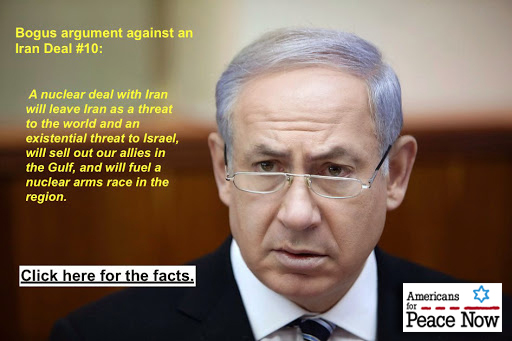 A nuclear deal with Iran will leave Iran as a threat to the world and an existential threat
to Israel, will sell out our allies in the Gulf, and will fuel a nuclear arms race in the region.
A nuclear deal with Iran will leave Iran as a threat to the world and an existential threat
to Israel, will sell out our allies in the Gulf, and will fuel a nuclear arms race in the region.
- The prospect of Iran armed with nuclear weapons is indeed alarming, particularly to Israel, which exists in close proximity to Iran and which has over the years been the target of harsh threats from various Iranian political and religious figures. It is also alarming to many countries in the Middle East, who see Iran as seeking regional dominance and meddling in their affairs.
- Neither diplomacy nor military action can guarantee that Iran will not someday decide to pursue nuclear weapons. Iran long ago acquired the knowledge and expertise to do so. International pressure and sanctions have impeded Iran’s nuclear program for years, but more importantly, leaders in Iran today have decided not to pursue an active nuclear weapons program.
- A negotiated deal can bolster this decision, while further rolling back Iran’s nuclear capacity such that if Iran’s leaders someday have a change of heart, the U.S. and international community – including our friends and allies in the region – will have ample time and opportunity to take action.
- A negotiated deal with Iran would not imply U.S. endorsement of Iranian bad behavior elsewhere in the region, nor would it imply that the U.S. was abandoning traditional allies in favor of warmer ties with Iran.
- Rejecting a negotiated deal out-of-hand in favor of hardline demands for the complete eradication of Iran’s nuclear capacity is virtually guaranteed to have the oppose effect. Making the complete elimination of any Iranian nuclear capacity the end goal of U.S. policy is tantamount to demanding that the U.S. go to war, and is likely to strengthen those in Iran who view the acquisition of nuclear weapons as necessary to deter such military action. Such a policy would, in fact, be far more likely to fuel regional instability and an arms race than a negotiated deal would.
Click here for our full report covering the 11 most common bogus arguments Israeli Prime Minister Netanyahu and other opponents of an Iran deal are making.